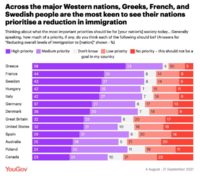Friends of China
It has been interesting to watch the defenders of close relations between Germany and China mobilize over the past months to try to head off a more critical approach from the new government in Berlin. It started with a handful of discreet post-election meetings between Angela Merkel and senior European decision-makers, including her successor Olaf Scholz, in which the outgoing chancellor conveyed her concerns about a tougher line. It continued in late November with a below-the-radar visit from a group of Chinese officials with deep ties to Germany. Led by former ambassador Shi Mingde, they spent over a week in Berlin, Munich, and Stuttgart meeting with Germany’s political and corporate elite—including people close to Scholz. Their message: let’s work together to ensure that the special relationship between Berlin and Beijing does not go off the rails.
In recent weeks, we have seen a more public campaign from some of Germany’s top CEOs. Volkswagen’s Herbert Diess
took to LinkedIn shortly before Christmas to warn that any push by Germany or Europe to decouple from China (a push that, by the way, does not exist) would be “very damaging.” “We need more cooperation and presence in China, not less!” he wrote. Siemens CEO Roland Busch added his voice last week,
telling the Süddeutsche Zeitung that China deserved respect and that banning the import of products from the Xinjiang region would endanger Germany’s green transition.
Coalition Tension
What to make of all this? First, it is clear that new Foreign Minister Annalena Baerbock, who has promised a tougher approach to China, has unsettled a lot of important people. Although she has been
measured in her statements since assuming her new post—making clear, for instance, that Germany cannot decouple from China—she has become the target of a campaign that is portraying her approach as naïve and dangerous. Baerbock has allies in Berlin and other capitals, most notably in Washington, but she will need to keep her nerve in the face of resistance from powerful interests in German industry and politics. Her ministry will be taking the lead in writing the new China strategy that was promised in the government’s coalition treaty. If this process forces a real debate between the different China camps in Berlin, then it will be constructive.
Second, one month into the new government, one has to ask whether Scholz may himself be a member of the aforementioned resistance. No one who watched his political rise in recent years expected him to shake up German policy toward China once he landed in the Chancellery. As finance minister under Merkel and as the lead candidate for the Social Democrats (SPD) in the elections, he stood out mainly for his refusal to take clear positions on the big geopolitical questions involving Beijing. Scholz came into office promising continuity in foreign policy—a Merkel approach with SPD characteristics. Still,
the signals he has sent on China in his first weeks running Germany’s new coalition government have been surprisingly soft in tone and content. In a very short time, Scholz has managed to undercut the main messages on China policy that were set out in its governing blueprint.
Lithuania
The coalition agreement promises a more united European approach to China, and yet Scholz has remained silent in the face of Beijing’s campaign of economic coercion against Lithuania. People briefed on his conversation with President Xi Jinping in late December told me that he did not raise the case of Lithuania, even though some German officials had urged him to do so. After all, a dozen German companies have been swept up in China’s unofficial ban on Lithuanian imports. For several smaller Mittelstand companies, the impact on business has been serious. “We have been really surprised by the silence coming from Berlin,” one senior EU official told me. “This is a government that was promising to take a more European approach, to push back against China’s bullying. We haven’t seen any of that so far.”
I have spoken with nearly a dozen officials in Berlin, Brussels, and other European capitals about the Lithuania case in recent weeks, and it is clear that several member states are deeply unhappy with the way Vilnius tackled the Taiwan issue. Although the EU’s High Representative for Foreign and Security Policy Josep Borrell and Trade Commissioner Valdis Dombrovskis issued a
strong statement of solidarity with Lithuania in early December, EU leaders meeting in Brussels a week later said nothing about the case. There is a widespread suspicion in Berlin—though no proof to back it up—that the United States helped trigger this crisis by pushing Lithuania to green-light the opening of a representative office in Vilnius that carries the name Taiwan.
Some European diplomats have noted that Lithuania asked the United States to watch over its diplomatic complex in Beijing after
withdrawing its embassy staff in late December. “This is not about China. It’s about the US and Russia,” one German diplomat told me. “The Eastern Europeans are seriously concerned about America’s commitment to the region and China is the chip to play.” But China’s decision to “Europeanize” the matter by blocking the imports of German, French, and other European companies that operate in, or source products from, Lithuania should be a wake-up call. In Brussels, it is seen as a direct attack on the integrity of the single market, requiring a strong, united response. That may still come. But it will require leadership, not silence, from Scholz and other European leaders.
Return of the CAI?
Another message from the coalition government’s agreement was that the conditions for finalizing the EU-China Comprehensive Agreement on Investment (CAI) agreement have not been met. And yet Scholz,
according to the Chinese readout of his conversation with Xi, expressed hope that it would be implemented at an “early date.” At the moment, it is very hard to imagine the CAI being resuscitated without the removal of China’s sanctions against European lawmakers, which is highly unlikely. But don’t be surprised to see China try to chip away at European resistance in the months ahead with a series of cosmetic steps. What might these include?
First, Chinese officials have signaled to their European counterparts that they plan to address one of the main criticisms of the CAI by signing up to the International Labor Organization’s fundamental conventions on forced labor (numbers 29 and 105) in early 2022. Second, they have sent messages recently that they are open to allowing a delegation of European officials to visit Xinjiang later this year. And third, they have made clear that, although their sanctions against European entities will not be removed, neither will they be strictly enforced. During his visit to Berlin in late November, former ambassador Shi Mingde met with sanctioned member of the European Parliament Reinhard Bütikofer and with Mikko Huotari, director of the sanctioned Mercator Institute for China Studies. His message was that Beijing was prepared to gradually step up engagement with them despite the sanctions. Could Scholz and others in Europe seize on these moves to mount a new push for the ratification of the CAI? Or might they work with their Chinese counterparts to ensure its implementation without formal ratification? It is a concern that some critics of the deal now have.
Bypassing the EU
As EU officials in Brussels try to make sense of the conflicting signals being sent by the new government in Berlin, they are preparing to re-engage with Beijing themselves. An EU-China summit that had been tentatively scheduled to take place on January 14 has now been pushed back until late March, I was told. The Chinese side requested the delay in order to prepare a summit with “real deliverables,” according to one EU official. But if there is one clear message as 2022 begins, it is that China would prefer to sidestep Brussels and focus its diplomatic energy on the more malleable EU member states. One sign of this: Beijing’s ambassador to the EU, Zhang Ming,
left his post last month and a replacement has still not been named. Why engage with EU officials who have become ever more strident in their
criticism of China’s behavior when capitals like Berlin and Paris are striking more dulcet tones? Only the member states can put an end to this damaging dynamic but it is unclear whether they want to.
Biden Ultimatum
In Washington, officials are watching on nervously. I was told that senior members of the National Security Council had recently conveyed the message to German officials that they would see a return of bare-knuckles US unilateralism if they did not send clear signals about their readiness to work with Washington on China by the US midterm elections in November. Scholz has said all the right things about the transatlantic relationship since becoming chancellor, highlighting the importance of German-US ties in his
first speech to the Bundestag and in his new year’s address. But expressing in his first call with Xi his desire to deepen the “bilateral partnership” and economic relationship with China sent a different message. As a German diplomat told me, “Scholz does not want to align with Washington on China. He is going to try to wiggle his way through, kick the can, and plead for time.” Sounds familiar?













